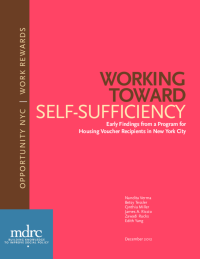Working Toward Self-Sufficiency
Early Findings from a Program for Housing Voucher Recipients in New York City
In 2007, New York City’s Center for Economic Opportunity launched Opportunity NYC–Work Rewards, a new test of three alternative but related ways of increasing employment and earnings for families who receive Housing Choice Vouchers to subsidize their rent. Two of the interventions include the Family Self-Sufficiency (FSS) program, the main federal effort for increasing employment and earnings and reducing reliance on government subsidies among housing voucher recipients. FSS offers case management designed to connect participants to services that can help them prepare for, find, and advance in work. But as their income increases, so does their share of the rent. Thus, FSS also includes a component through which families can build their savings by diverting their increased rent payments into interest-bearing “escrow accounts” maintained by the housing authority and paid to participants when they complete the program, which could take five years or more. The Work Rewards demonstration includes the first random assignment study of the FSS program and a test of an enhanced version of the program that combined FSS with special incentives (paid every two months) to encourage sustained full-time employment. Finally, the demonstration tests the effects of those same incentives offered without FSS, to determine whether this administratively simpler and potentially less costly approach could be effective. This report presents the early findings from the first two and a half years of follow-up.
Key Findings
- There is no evidence so far that FSS improved labor market outcomes for the full sample enrolled in FSS alone.
- The combination of FSS and special work incentives also produced no consistent effects on employment and earnings for the full sample. However, FSS plus the incentives produced large and statistically significant increases in average quarterly employment rates and average earnings (a gain of 45 percent over the control group average) for the subgroup of voucher holders who were not working at study entry.
- The special work incentives alone produced no consistent overall effects for the full sample. However, they produced statistically significant increases in earnings for participants who were receiving food stamps at study entry. The FSS-only intervention produced a similar pattern of effects. Although it is impossible to say for certain, the special incentives might have offset this population’s concerns about potential reductions in their food stamp benefits if they earned more money, thus counteracting possible disincentives to work.
- It is also possible that the FSS services and escrow offer may have encouraged voucher holders who were receiving food stamps to reassess the likely payoff from working more.
- None of the models so far has shown effects on the group that was employed when the study began, suggesting more generally that it may be worthwhile to reexamine how FSS programs approach this group.
Work Rewards will track participants’ outcomes through 2013. Future reports will also include results from a three-year survey and a benefit-cost analysis. These findings should inform future research on FSS, particularly a new national evaluation of FSS that MDRC is conducting for the U.S. Department of Housing and Urban Development.






